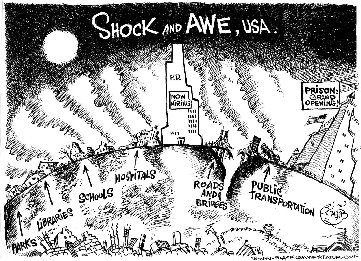Buildup to Iraq war affected Iran diplomacy

By John Daniszewski, Alissa J. Rubin and Paul Richter, Tribune Newspapers: Los Angeles Times
Published February 5, 2006
VIENNA -- The bruising diplomatic wars that preceded the U.S.-led invasion of Iraq three years ago cast a long shadow over the debate on whether to report Iran to the UN Security Council.
While many in Washington believed that Iran should have been referred to the Security Council when Tehran's secret uranium enrichment program was discovered by the international community 2 1/2 years ago, the Bush administration had to overcome doubts about its intentions after the Iraq invasion. The U.S. finally won a measure of success Saturday, when the International Atomic Energy Agency's board voted to send the matter on to the council.
American credibility on the issue of limiting weapons of mass destruction was damaged in Iraq, where the administration's accusations of an advanced nuclear program proved groundless. Meanwhile, the war in Iraq--triggered in part by the search for those weapons--grinds on with scant hope of ending soon.
"You can understand why the concerns exist," said Wayne White, a former senior of the State Department's Bureau of Intelligence and Research until last year. For many countries, he said, President Bush's strong words about Iran in last week's State of the Union Message may have "almost sounded like `axis of evil' stuff."
The U.S. would be in a stronger position to argue for using collective international action against Iran if it had not short-circuited international deliberations in early 2003 before going into Iraq, argued Mark Brzezinski, a former National Security Council aide during the administration of President Bill Clinton. "We're reaping what we sowed here," he said.
Although U.S. diplomats are loath to make the comparison openly, there is a tacit acknowledgment that in the case of Iran they now see the wisdom of not pushing too hard, too fast.
"There's recognition from Iraq that the U.S. cannot solve the Iran problem alone," said George Perkovich, vice president for studies at the Carnegie Endowment for International Peace.
"Related to that, there is no military option that gives you high confidence that you've solved the nuclear issue, even for a short time, without creating consequences that are so bad that you can't work with them."
Copyright © 2006, Chicago Tribune
Link Here




0 Comments:
Post a Comment
<< Home